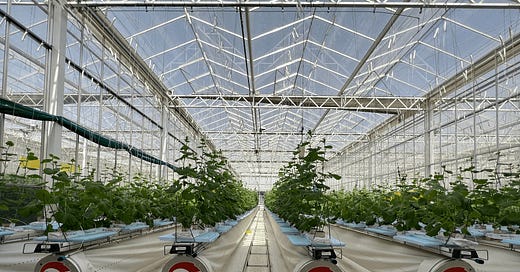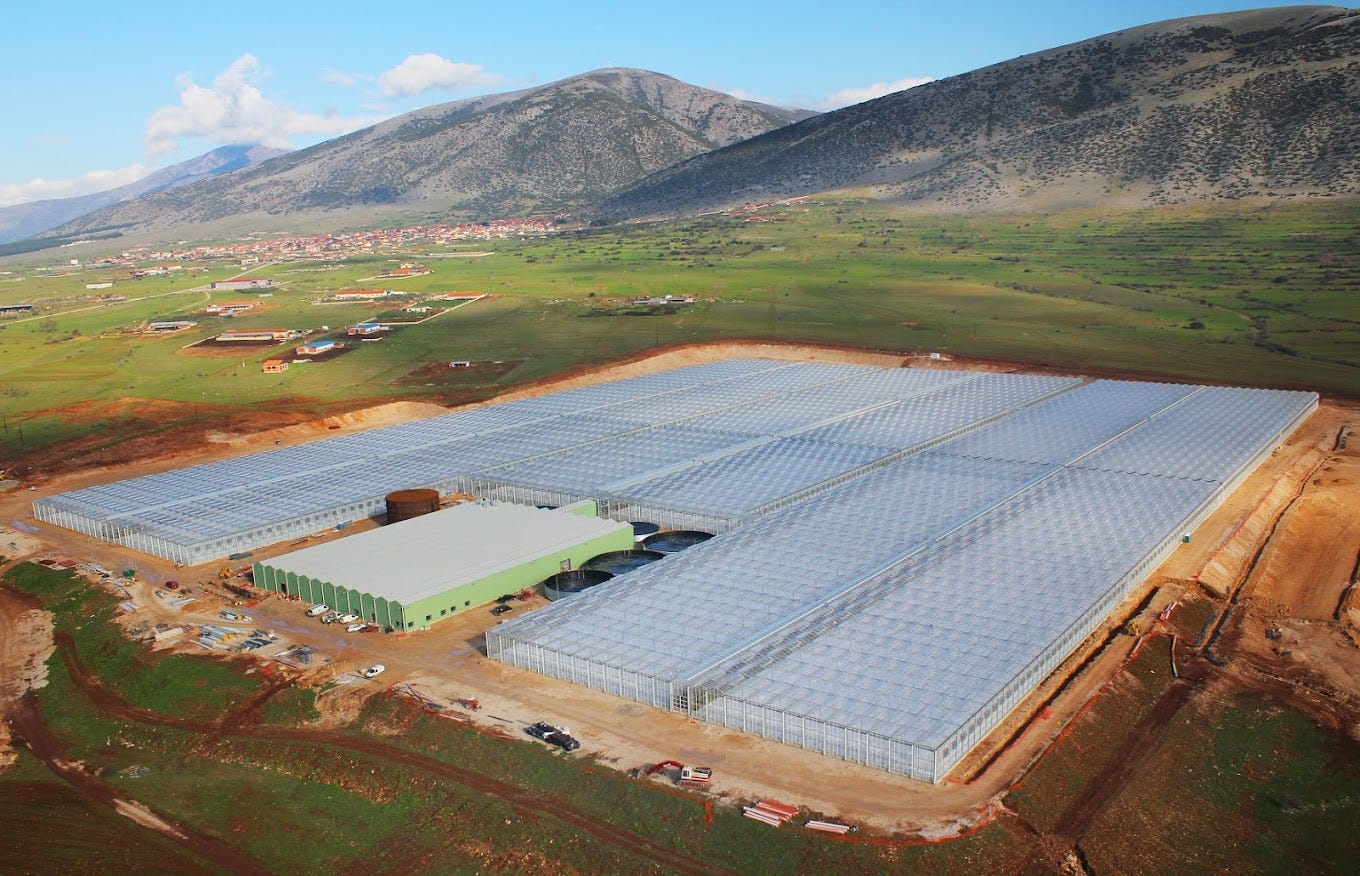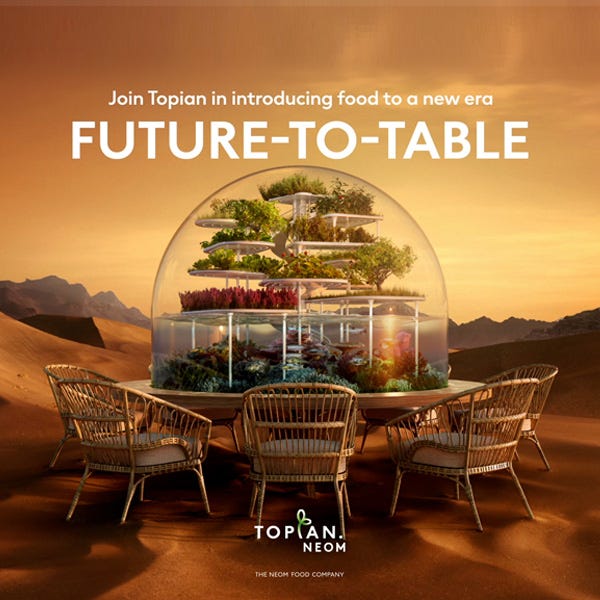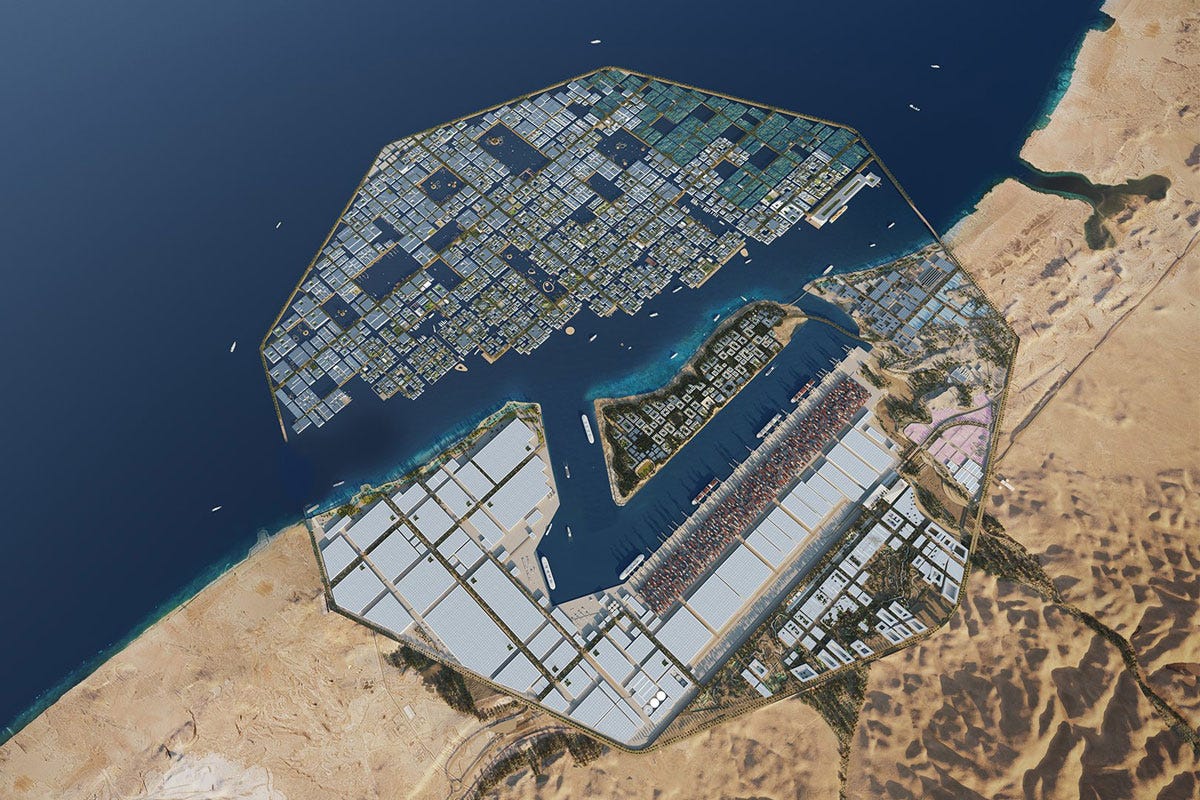Today, we will cover the essential food infrastructure of NEOM, which is actively recruiting for multiple positions as part of the larger project.
Topian is NEOM’s indigenous food company, which, in theory, is designed to feed all of the inhabitants of the future city. Quite a feat considering the climate and massive amounts of water needed to grow vegetables in greenhouses, let’s find out more.
The Topian project will focus on “innovative strategies to make agriculture and food production more sustainable and environmentally friendly,” writes the homepage headed by Dr Juan Carlos Motamayor, who heads the project.
At its core, the initiative aims to enhance water efficiency in farming through what's termed 'climate-proof agriculture,' ensuring crops receive precise irrigation to minimize water waste while optimising yields.
Additionally, the project advocates for regenerative aquaculture, a practice designed to produce high-value seafood with minimal impact on marine ecosystems, supporting the health of the ocean's flora and fauna. The venture also explores the development of novel foods, seeking alternative, sustainable food sources that cater to the changing tastes and dietary preferences of consumers.
Finding partners across the world
However, to meet these challenges, the project has to scour the planet for partners with the latest technology to make this happen.
To attempt this, Topian is partnering with a Dutch greenhouse company to create a "synthetic climate" to make that plan a reality. The project involves building a horticulture oasis on the outskirts of NEOM.
The area being carved out amounts to approximately 15 football fields. This marks the largest food-tech investment for a country that is primarily arid and has experienced extreme summer temperatures, leaving it heavily reliant on imports to supply most of its food.
The Dutch horticulturist, Van Der Hoeven, has signed a $120mn contract NEOM. This will involve designing and constructing two test facilities on Neom's outskirts, as well as providing their service and operation over multiple years.
The goal of this project is to create a "synthetic climate" where outdoor growing is difficult, with the aim that plants yield produce year-round.
Understanding the challenges, food security is a top priority for the planners of Neom, which is Crown Prince Mohammed bin Salman's $500 billion project to transform an expanse of desert the size of Belgium into a high-tech region that could eventually host millions of people.
To top that, in line with environmental and social governance (ESG) criteria, the project proposes reimagining the food supply chain to enhance sustainability and ethical practices.
This approach suggests a shift in how food is produced, transported, and consumed, aiming to establish more sustainable and responsible food systems.
Aquaculture & Marine
In an interview with the Fishsite on the sidelines of the SIMEC trade show, Motamayor, noted the growth plans of the wider project including plans to produce 80,000 tonnes of seafood within 15 years, of which three quarters will be produced in land-based facilities, while the final quarter will be grown offshore in the region.
For marine-based aquaculture, we are currently doing open sea pens and submersible sea pens, and we are also in the process of developing contacts for various types of enclosed sea pens, the CEO said.
He added, “We need to evaluate which are the most cost-efficient and have the least impact on the marine ecosystem.”
In an earlier interview with Fruitnet in 2023, Motamayor said of the project: “Most modern agricultural practices were developed at a time when climate change was not the reality it is now,” he said.
He added: “Now, the agricultural model is making climate change worse, and climate change in turn makes our current food production model unsustainable. It’s a vicious circle that we urgently need to break. We must produce more with less. Less land. Less water. Particularly in arid conditions like in the Middle East.”
Neom, in northwest Saudi Arabia, offers a testing ground for future-focused food production methods in extreme climates.
Motamayor explained that they are currently conducting large-scale technological projects to test various combinations of technology that will help achieve food self-sufficiency and mitigate climate change by reducing the distance that food has to travel.
Topian are focusing on the efficient use of water, which is a crucial aspect of their initiative. Due to resource overuse and climate change, the gap between global water supply and demand is projected to reach 40% by 2030, the company CEO noted.
ENOWA Spearheading Saudi's Renewable Energy Push
Saudi Arabia's energy company ENOWA, a key player in the sustainable energy sector for the NEOM project, is spearheading the country's shift to renewable energy and aims to develop local talent in the field.NEMNNA is a reader-supported publication. To receive new posts and support my work, consider becoming a free or paid subscriber.









